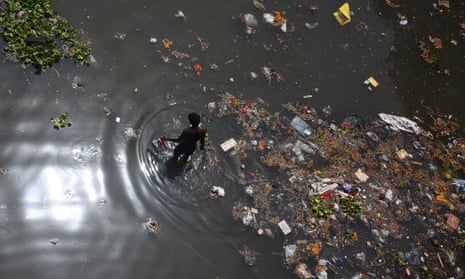A spiritual festival held along an Indian river last year, despite warnings by the country’s environmental watchdog, caused more than £5m of damage that could take 10 years to fix, according to a report.
One of India’s most celebrated gurus, Sri Sri Ravi Shankar, headlined the World Culture festival along Delhi’s Yamuna river in March last year, drawing more than 3 million visitors including the Indian prime minister, Narendra Modi.
The three-day festival, which featured yoga sessions, performances and prayers for world peace, involved the construction of a three-hectare (seven-acre) stage that organisers boasted was the largest ever.
World's largest stage of 7 acres with no foundation sat on thin plates. An architectural marvel?! Or adventure?! pic.twitter.com/tvItAIBSqe
— Sri Sri Ravi Shankar (@SriSri) March 15, 2016
Pontoon bridges, portable cabins and parking facilities were also constructed over dozens of hectares in the fragile ecosystem.
India’s top environmental court had restricted building activity along the Yamuna more than a year earlier, but found that preparations were “in full swing” by the time its officers inspected the festival site in February 2016.
Shankar was fined 50m rupees (£618,000) as “environmental compensation” before the event, a sum he initially refused to pay, insisting: “We have done nothing wrong. I will go to jail but not pay the fine.”
A committee appointed to assess the damage reported on Wednesday that the festival had destroyed the riverbed and adversely affected more than 170 hectares of the floodplains.
It estimated that rehabilitating the river, which was this month granted the legal status of a “living entity”, would take 10 years and potentially cost 420m rupees.
The festival had led to a “change in topography and habitat diversity, loss of waterbodies and wetlands, loss of floodplain vegetation and biodiversity … and loss of ecosystem functions”, the report said.
Shankar is one of a number of gurus whose popularity – and political influence – have surged in recent years as a swelling Indian middle class tries to remain connected to its cultural and religious roots.
He was personally thanked by Colombia’s president, Juan Manuel Santos, for helping to negotiate the country’s recent peace deal with Farc guerrillas after a 52-year civil war.
Another ascetic, Baba Ramdev, has turned his popularity into a £530m retail empire selling Indian alternatives to imported products.
Both the Modi-led national government and the Delhi administration, normally at loggerheads, had supported Shankar’s event, and the Delhi water minister, Kapil Mishra, continued to defend it on Thursday.
Truth will always Triumph;
— Sri Sri Ravi Shankar (@SriSri) April 13, 2017
However before that, lies will have their dance.
Just wait and watch!
Shankar said in a statement the report was “completely flawed, unscientific and biased”. “There is no evidence at all to justify their claims. We will fight for truth to triumph,” he said.
The Yamuna river, regarded as holy water by Hindus, originates in the Himalayas and is virtually unpolluted until it reaches Delhi, where it is diverted for use by the city’s residents.
Delhi takes the freshwater and replaces it with untreated sewage and chemical effluents from more than 20 drains, leaving the river unable to support life and barely flowing.
Tens of millions of rupees have been spent in the past two decades to clean the river, with little improvement in water quality. Experts blame poor coordination between agencies and say too much water is being diverted for human use.
